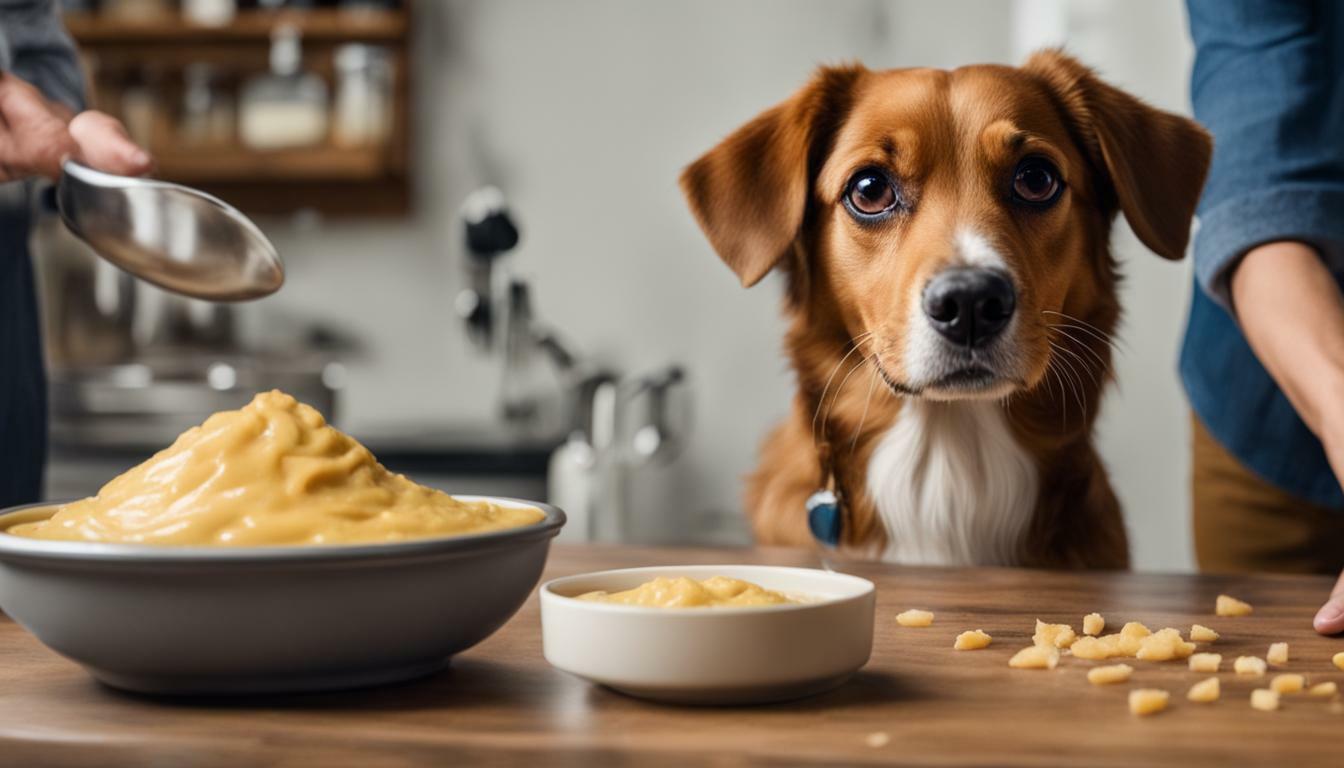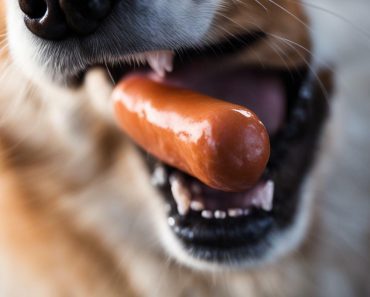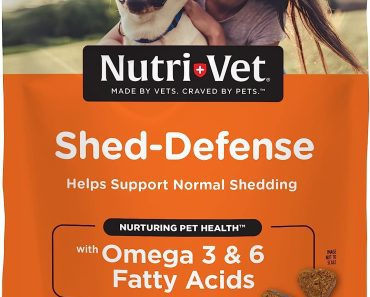The Safety of Applesauce for Dogs
Before incorporating applesauce into your dog’s diet, it’s crucial to understand the safety considerations. According to experts, dogs can eat plain applesauce, as long as it does not contain any harmful ingredients such as lemon juice, cider vinegar, cinnamon, or sugar. Homemade applesauce made from apples alone is safe for dogs and can be given as an occasional treat. However, store-bought applesauce may contain additives that are not suitable for dogs.
Applesauce is not necessary for a dog’s diet, as they can get the necessary nutrients from their complete and balanced dog food. When offering applesauce to dogs, it is important to remove the seeds, cores, and any large pieces of apple to prevent choking. Dogs should only be given small amounts of applesauce as treats, and it should not exceed 10% of their daily calorie intake.
It is always advisable to consult with a veterinarian before introducing any human food to a dog’s diet. They can provide guidance tailored to your dog’s specific dietary needs and ensure that applesauce is safe and appropriate for your furry friend.
See the table below for a summary of the safety considerations when feeding dogs applesauce:
| Safety Considerations | Details |
|---|---|
| Ingredients to Avoid | Avoid applesauce with harmful ingredients like lemon juice, cider vinegar, cinnamon, or sugar. |
| Homemade vs. Store-Bought | Homemade applesauce made from apples alone is safer than store-bought varieties that may contain additives. |
| Portion Sizes | Offer small amounts of applesauce as treats, not exceeding 10% of a dog’s daily calorie intake. |
| Choking Hazard | Ensure to remove seeds, cores, and large apple pieces to prevent choking. |
| Veterinary Consultation | Consult with a veterinarian before introducing any changes to your dog’s diet, including applesauce. |
Remember, a balanced and complete dog food should always be the foundation of your dog’s diet. Applesauce can be a tasty and occasional addition, but it should never replace their main meals. By following these safety considerations and consulting with your vet, you can ensure that your dog enjoys applesauce as a safe and healthy treat.
Homemade vs. Store-Bought Applesauce for Dogs
When deciding to offer applesauce to your furry friend, it’s important to know whether homemade or store-bought options are more suitable. Homemade applesauce made from fresh apples provides a healthier choice for dogs, as it contains no additives or preservatives that can be harmful to their health. Additionally, homemade applesauce allows you to have control over the ingredients, ensuring that your dog receives a natural and nutritious treat.
On the other hand, store-bought applesauce may not be the best option for dogs. Many commercially available applesauces contain added sugars and artificial sweeteners, which can lead to weight gain and even dental issues for dogs. Furthermore, store-bought varieties often include flavorings, such as cinnamon, that can cause gastrointestinal problems in dogs. It is vital to read the ingredient label carefully before offering store-bought applesauce to your dog.
Creating homemade applesauce for your dog is a simple process. Start by choosing fresh, organic apples and remove the seeds, cores, and skin. Boil the apples until they are soft and then blend them into a smooth puree. You can also add a small amount of water to achieve the desired consistency. Remember to let the applesauce cool before serving it to your dog. By making your own applesauce, you have full control over the ingredients and can ensure that it is a safe and healthy treat for your canine companion.
Homemade Applesauce Recipe for Dogs:
| Ingredients: | Instructions: |
|---|---|
| – Fresh organic apples | 1. Wash the apples thoroughly and remove the seeds, cores, and skin. |
| – Water (optional) | 2. Cut the apples into small pieces and place them in a pot. |
| 3. Add enough water to cover the apples, if desired. | |
| 4. Bring the mixture to a boil and simmer until the apples are soft. | |
| 5. Remove from heat and let the mixture cool. | |
| 6. Blend the cooked apples until you achieve a smooth puree. | |
| 7. Serve the homemade applesauce to your dog in small amounts as an occasional treat. |
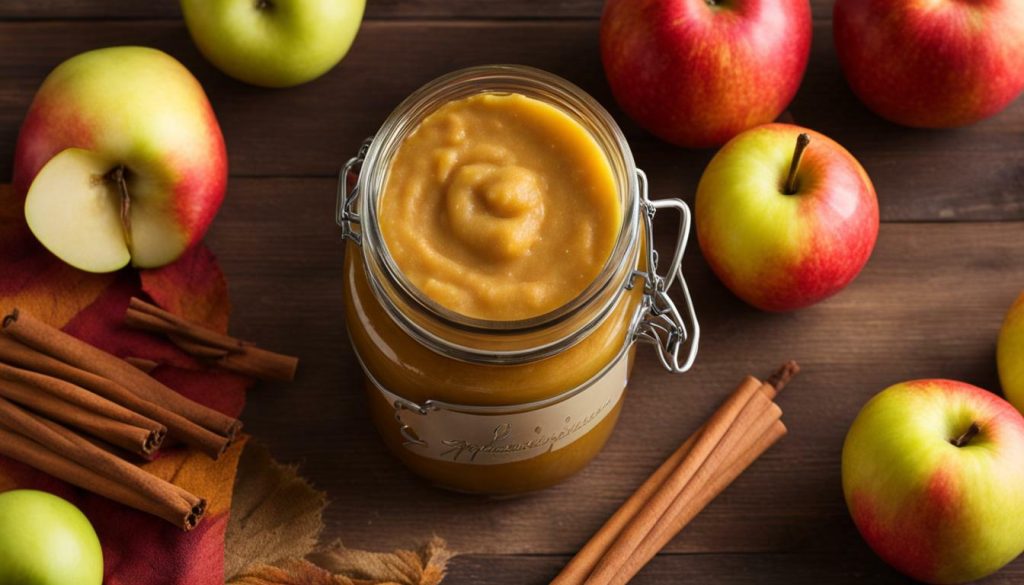
Remember, applesauce should only be given to dogs in moderation, regardless of whether it is homemade or store-bought. Although applesauce can provide some nutritional benefits, it should not replace a balanced diet formulated specifically for dogs. Additionally, it’s always a good idea to consult with your veterinarian before introducing any new food to your dog’s diet, including applesauce. By making informed choices and practicing moderation, you can safely incorporate applesauce into your dog’s treat rotation.
Nutritional Benefits of Applesauce for Dogs
While applesauce may be a tasty treat for dogs, it’s worth noting the potential nutritional benefits it can provide. Applesauce is rich in vitamins, minerals, and fiber, making it a healthy addition to a dog’s diet when given in moderation.
One of the main benefits of applesauce is its high vitamin C content. This vitamin plays a crucial role in supporting a dog’s immune system, helping to ward off illnesses and promote overall health. Additionally, the fiber found in applesauce can aid in digestion, helping to regulate bowel movements and prevent constipation.
“Applesauce is a great source of vitamins and fiber for dogs. It can provide a refreshing and nutritious treat, especially during hot summer months,” says Dr. Emily Roberts, a veterinarian with expertise in canine nutrition.
Furthermore, applesauce contains antioxidants, such as flavonoids and polyphenols, that can help protect a dog’s cells from damage caused by free radicals. These antioxidants have anti-inflammatory properties and may contribute to a dog’s overall well-being. However, it’s important to note that excessive consumption of applesauce can lead to gastrointestinal upset, so moderation is key.
Applesauce Nutritional Information
| Nutrient | Amount per 100g |
|---|---|
| Calories | 52 |
| Protein | 0.2g |
| Fat | 0.1g |
| Carbohydrates | 13.7g |
| Fiber | 1.8g |
| Vitamin C | 2.4mg |
| Potassium | 91mg |
These nutritional values are approximate and may vary depending on the specific brand and preparation method of the applesauce. Always check the label or consult with a veterinarian to ensure the applesauce you are offering to your dog aligns with their dietary needs.
Remember, while applesauce can provide some nutritional benefits, it should be given in moderation and should never replace a complete and balanced dog food. If you are unsure about incorporating applesauce into your dog’s diet, consult with your veterinarian for personalized advice.
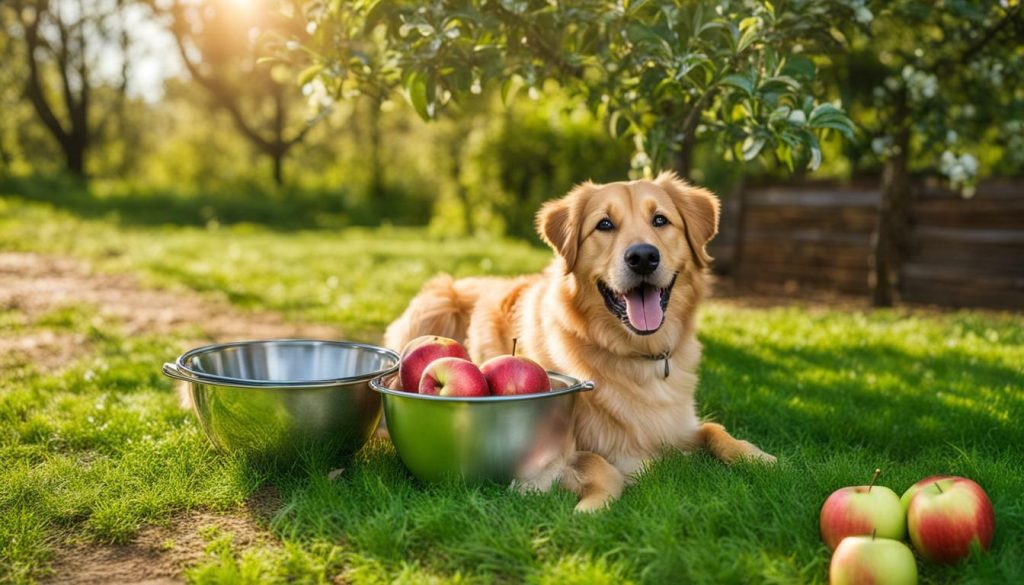
Applesauce as an Occasional Dog Treat
Applesauce can be a delightful indulgence for dogs, but it’s important to understand the appropriate way to offer it as a treat. According to experts, plain applesauce made from apples alone is safe for dogs and can be given in moderation. However, it’s essential to be cautious when choosing store-bought varieties, as they may contain additives that can be harmful to dogs. To ensure the safety of your furry friend, it’s best to opt for homemade applesauce without any additional ingredients.
When giving your dog applesauce as a treat, it’s crucial to remove any seeds, cores, or large apple pieces to prevent choking or digestive issues. It’s recommended to offer small amounts of applesauce, as it should not exceed 10% of your dog’s daily calorie intake. Remember that applesauce should never replace a complete and balanced dog food, as dogs can obtain all the necessary nutrients from their regular meals.

Consulting with a veterinarian before introducing any human food to your dog’s diet is always advisable. They can provide guidance based on your dog’s specific dietary needs and help ensure that applesauce or any other treat is given safely. Your vet can also recommend the appropriate portion size and frequency of offering applesauce as a treat. By keeping these guidelines in mind, you can enjoy sharing the occasional applesauce treat with your furry companion while keeping their health and well-being a top priority.
Precautions When Feeding Dogs Applesauce
While dogs can typically enjoy applesauce, some precautions need to be taken to ensure their safety and well-being. It is important to remember that not all applesauce brands are suitable for dogs, as some may contain harmful ingredients. Homemade applesauce made solely from apples is the safest option, as it avoids any potential additives that may be present in store-bought varieties.
“Dogs should only be given small amounts of applesauce as treats, and it should not exceed 10% of their daily calorie intake.”
When offering applesauce to dogs, it is crucial to remove seeds, cores, and any large pieces of apple to prevent choking or digestive issues. Dogs have different digestive systems compared to humans, and certain parts of an apple can be harmful to them. It is always best to err on the side of caution and ensure that the applesauce is free from any potential hazards.

| Precautions When Feeding Dogs Applesauce: |
|---|
| Choose plain applesauce without additives and harmful ingredients. |
| Homemade applesauce made solely from apples is the safest option. |
| Remove seeds, cores, and any large pieces of apple to prevent choking. |
| Limit the amount of applesauce given to dogs and ensure it does not exceed 10% of their daily calorie intake. |
| Consult with a veterinarian before introducing any human food to a dog’s diet. |
Always remember that applesauce should be considered as an occasional treat for dogs and not a necessity in their diet. Dogs can obtain all the necessary nutrients from their complete and balanced dog food, and applesauce should be offered in moderation. If you have any concerns or questions about feeding your dog applesauce, it is essential to consult with a veterinarian who can provide tailored advice based on your dog’s specific needs.
Applesauce and Caloric Intake in Dogs
Like any treat, it’s essential to consider the caloric implications of feeding dogs applesauce and adhere to appropriate serving sizes. While applesauce can be a tasty and nutritious addition to a dog’s diet, it should be given in moderation to prevent weight gain and ensure a balanced caloric intake.
According to experts, dogs should not consume more than 10% of their daily calorie allowance in treats, including applesauce. The caloric content of applesauce can vary depending on the brand and ingredients used. As a general guideline, one tablespoon of plain, unsweetened applesauce contains approximately 15 calories.
It’s important to keep in mind that the calorie content of applesauce can increase significantly if it contains added sugars or sweeteners. Therefore, it’s best to opt for homemade applesauce made from fresh apples to ensure it is free from any unnecessary additives or preservatives.
To put it into perspective, a small dog weighing around 20 pounds may require about 500-600 calories per day. If you choose to offer applesauce as a treat, be sure to factor in the calories from the applesauce into their overall daily intake. This will help maintain a healthy weight and prevent overindulgence.

In conclusion, while dogs can enjoy the occasional taste of applesauce, it’s important to be mindful of their caloric intake. Treats should always be given in moderation and should not exceed 10% of a dog’s daily calorie allowance. If you have any concerns or questions regarding your dog’s diet, it is best to consult with a veterinarian for personalized advice.
Applesauce as a Supplement, Not a Necessity
While applesauce can have benefits, it’s crucial to remember that it should not replace a well-balanced dog food diet. Applesauce can serve as a tasty occasional treat for your furry friend, but it should not be relied upon as a primary source of nutrition.
According to experts, dogs can eat plain applesauce made from apples alone, as long as it does not contain any harmful ingredients such as lemon juice, cider vinegar, cinnamon, or sugar. Homemade applesauce is a safer option for dogs as it eliminates the risk of additives that store-bought varieties may contain.
It’s important to note that applesauce is not necessary for a dog’s diet. Dogs require a complete and balanced dog food that meets their nutritional needs. However, when offering applesauce as a treat, precautions should be taken to ensure your dog’s safety. Remove any seeds, cores, and larger apple pieces to prevent choking or digestive issues.
When incorporating applesauce into your dog’s diet, moderation is key. Dogs should only be given small amounts of applesauce as a treat, and it should not exceed 10% of their daily calorie intake. Consulting with a veterinarian before introducing any human food to your dog’s diet is always advisable to ensure it aligns with their specific dietary needs.
| Benefits of Applesauce for Dogs | Precautions When Feeding Dogs Applesauce |
|---|---|
|
|
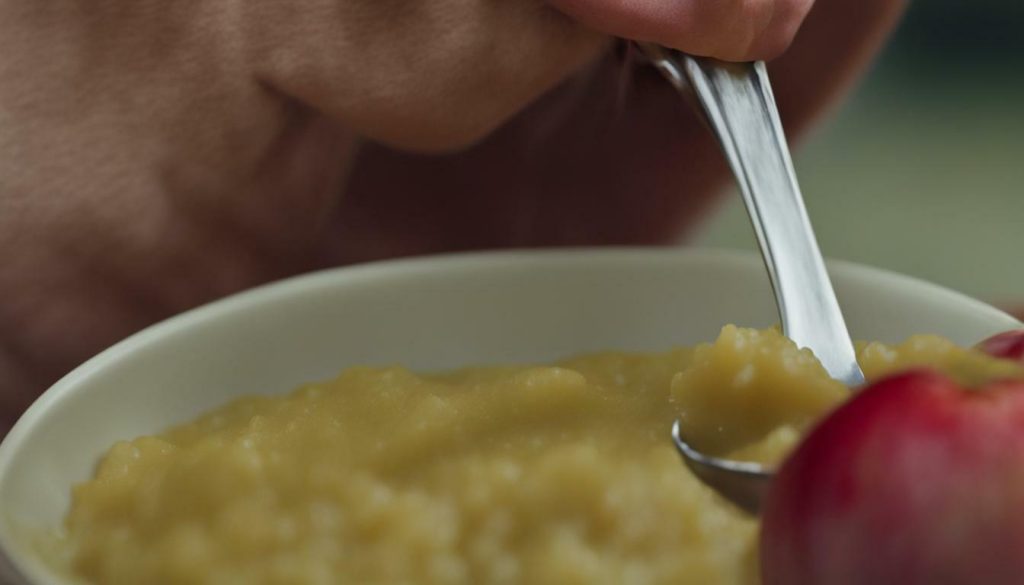
While applesauce can be enjoyed by dogs, it’s important to remember that it should be seen as a supplement rather than a necessity in their diet. By maintaining a balanced and nutritious dog food regimen, you can ensure that your furry companion receives all the essential nutrients they need to thrive. If you’re considering incorporating applesauce or any other human food into your dog’s diet, be sure to consult with your veterinarian for professional guidance tailored to your dog’s specific needs.
Consultation with Veterinarian for Dietary Changes
Before making any adjustments to your dog’s diet, including the addition of applesauce, it’s wise to consult with your veterinarian. A veterinarian can provide personalized advice and guidance based on your dog’s specific needs and health conditions. They can help you determine if applesauce is suitable for your dog and recommend appropriate portion sizes.
During the consultation, be prepared to discuss your dog’s overall diet, any known allergies or sensitivities, and any existing health conditions. This information will help the veterinarian assess the potential benefits and risks of introducing applesauce to your dog’s diet.
Additionally, a veterinarian can provide insight into the nutritional value of applesauce and its role in your dog’s overall nutrition. They can help you ensure that your dog is receiving a well-balanced diet and that any additions, like applesauce, are not interfering with their nutritional requirements.
Remember, each dog is unique, and what works for one dog may not work for another. The guidance of a veterinarian is crucial in making informed decisions about your dog’s diet and ensuring their long-term health and well-being.

| Key Points | Summary |
|---|---|
| Consult with a veterinarian | Seek professional advice before making any changes to your dog’s diet, including the addition of applesauce. |
| Personalized guidance | A veterinarian can provide personalized advice based on your dog’s specific needs and health conditions. |
| Diet assessment | A veterinarian can help assess the potential benefits and risks of adding applesauce to your dog’s diet and ensure it’s not interfering with their nutritional requirements. |
Finding Balance in Your Dog’s Diet
When it comes to feeding dogs, striking a balance between their nutritional needs and occasional treats like applesauce is key. Applesauce can be a tasty and nutritious addition to a dog’s diet, but it should be given in moderation and with some precautions.
One way to incorporate applesauce into your dog’s diet is by using it as a topping or mix-in for their regular meals. Adding a small amount of plain homemade applesauce to their food can provide a burst of flavor and moisture, making mealtime more enjoyable for them. Just be sure to check the ingredients and avoid any additives that are not safe for dogs.
Another option is to use applesauce as a standalone treat. You can freeze small portions of applesauce in an ice cube tray for a refreshing snack on hot days. Remember to remove any seeds, cores, or large apple pieces before serving. It’s a good idea to consult with your veterinarian to determine the appropriate portion size for your dog based on their size, age, and overall health.
| Benefits of Feeding Dogs Applesauce |
|---|
| Provides vitamins and minerals |
| Source of dietary fiber |
| Improves digestion and bowel movements |
| Helps maintain healthy skin and coat |
While applesauce can offer some nutritional benefits to dogs, it should not be considered a substitute for a complete and balanced dog food. It is important to provide a well-rounded diet that meets all of their nutritional needs. Applesauce should be viewed as an occasional treat or supplement to their regular meals.
Remember, every dog is unique, and their dietary needs may vary. It’s always a good idea to consult with your veterinarian before making any changes to your dog’s diet or introducing new foods. They can provide personalized recommendations based on your dog’s specific needs and help ensure that they are getting the appropriate balance of nutrients.
Conclusion
Applesauce can be a safe and tasty treat for dogs when given in moderation and with the necessary precautions. It should not be a staple in their diet but rather a supplement or occasional indulgence. By finding the right balance between their nutritional needs and occasional treats like applesauce, you can help keep your furry friend happy, healthy, and satisfied.
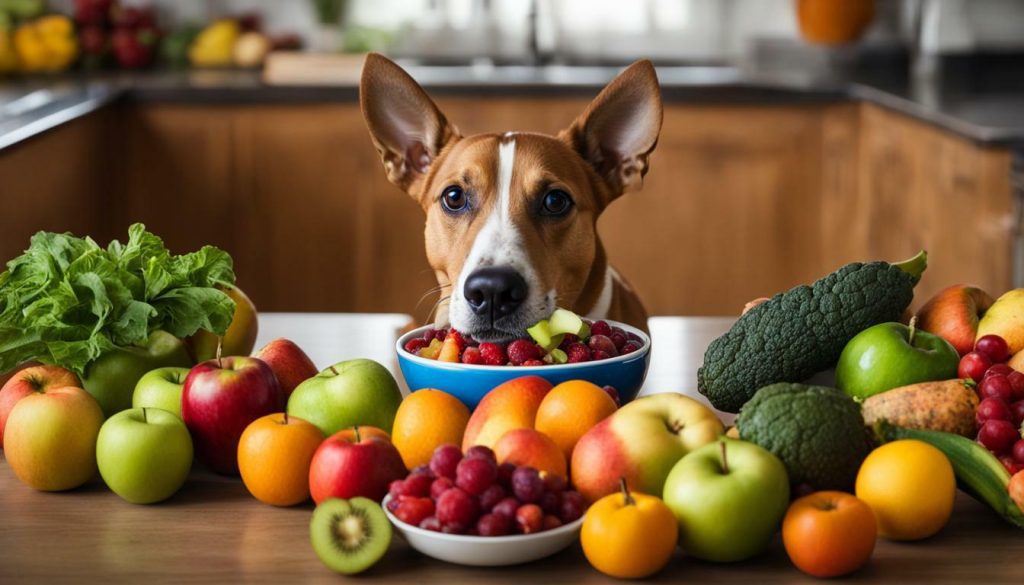
In Conclusion
Applesauce can be a delicious and occasional treat for dogs, but responsible pet owners should ensure its safety and suitability for their furry companions. According to experts, dogs can eat plain applesauce, as long as it does not contain any harmful ingredients such as lemon juice, cider vinegar, cinnamon, or sugar. Homemade applesauce made from apples alone is safe for dogs and can be given as an occasional treat. However, store-bought applesauce may contain additives that are not suitable for dogs.
While applesauce can offer some nutritional benefits to dogs, it is important to remember that it is not necessary for their diet. Dogs can obtain all the necessary nutrients from their complete and balanced dog food. When offering applesauce to dogs, it is crucial to remove the seeds, cores, and any large pieces of apple to prevent choking or digestive issues.
Applesauce should be given to dogs in small amounts as a treat and should not exceed 10% of their daily calorie intake. It is always advisable to consult with a veterinarian before introducing any new food to a dog’s diet, including applesauce. Every dog is unique and may have individual dietary needs that should be considered.
Ultimately, finding a balance in your dog’s diet is key. Applesauce can be a tasty addition, but it should not replace their regular meals or become a significant portion of their calorie intake. Remember, the overall nutrition and well-being of your dog should be the top priority when making dietary decisions.
FAQ
Can dogs eat applesauce?
Dogs can eat plain applesauce, as long as it does not contain any harmful ingredients such as lemon juice, cider vinegar, cinnamon, or sugar. Homemade applesauce made from apples alone is safe for dogs and can be given as an occasional treat.
What about store-bought applesauce?
Store-bought applesauce may contain additives that are not suitable for dogs. It is best to stick to homemade applesauce to ensure it is safe for your furry friend.
Is applesauce necessary for a dog’s diet?
No, applesauce is not necessary for a dog’s diet. Dogs can get all the necessary nutrients from their complete and balanced dog food.
How should I offer applesauce to my dog?
When offering applesauce to dogs, it is important to remove the seeds, cores, and any large pieces of apple to prevent choking. Dogs should only be given small amounts of applesauce as treats, and it should not exceed 10% of their daily calorie intake.
Should I consult a veterinarian before feeding my dog applesauce?
Yes, it is always advisable to consult with a veterinarian before introducing any human food to a dog’s diet. They can provide personalized advice based on your dog’s specific needs.

